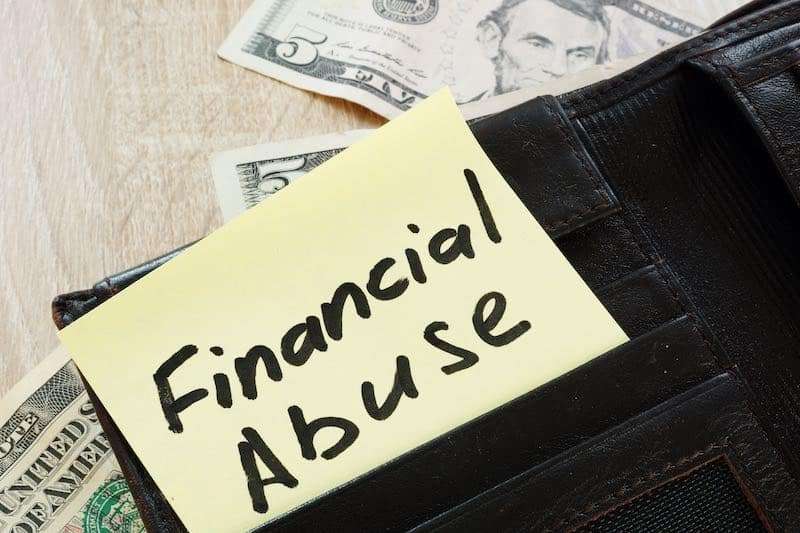
Just like verbal and physical abuse, financial abuse is an unfortunately prevalent and very harmful form of abuse that can occur in romantic relationships, including marriage. In fact, according to a study by the Allstate Foundation, one in four women and one in seven men have experienced financial abuse in their lifetime!

This type of abuse can have serious consequences, including financial ruin, emotional distress, and even homelessness. Despite its prevalence though, financial abuse is often unrecognised and underreported, making it crucial for individuals to become aware of the signs and take steps to escape.
Financial abuse can have long-lasting effects on an individual’s financial stability, credit score, and overall well-being. By recognising the signs of financial abuse, individuals can take steps to escape and protect themselves from further harm.
This article provides a comprehensive understanding of financial abuse in relationships, including its definition, types, and signs. It also discusses the impact of financial abuse, ways to report and escape it, and steps to recover from it.

What is Financial Abuse?
Financial abuse in relationships refers to the intentional control and/or exploitation of one partner’s financial resources and independence by the other partner. It is a type of abuse in which the abusive partner exerts control over the other’s financial resources and limits their ability to access or use money.
It can take many forms, such as controlling access to bank accounts or credit cards, forcing a partner to sign financial documents against their will, or manipulating a partner into incurring debt.
It can creep into a relationship in a subtle way, and a lot of women in particular describe the early days of such a relationship as having felt like someone else is rather taking good care of them and handling all financial matters because they love them.
The sad reality is that the person you trust the most can also wreak the most havoc on your financial situation at a moment’s notice.
There are several factors that can contribute to financial abuse in relationships, including power imbalances, financial dependence, and a history of other kinds of abuse. In some cases, financial abuse can also be motivated by greed or a desire for control, as is common behaviour with narcissists.
What are the Types of Financial Abuse?
Financial abuse can take many forms in relationships and range from mild to severe. It is important to understand the different types in order to recognise them and take action to escape and recover from abuse. Here are four common types of financial abuse:

Control and manipulation of finances
This type involves controlling access to financial resources, such as limiting the victim’s access to bank accounts, credit cards, or money. For example, a stay-at-home mum who relies on her partner for financial support may be denied money for basic necessities like food, medicine, and clothing. Also, an abusive partner may keep the victim from accessing joint bank accounts.
Economic exploitation
Economic exploitation involves taking advantage of a victim’s financial resources for personal gains, such as unsanctioned spending, or stealing their money or property. For example, an abusive partner may use their victim’s credit card on purchases without their knowledge or consent.
Financial sabotage
Financial sabotage involves actions that undermine the victim’s financial stability and security, such as ruining their credit or taking on debt in their name. For instance, running up large amounts of credit card debt or taking loans with forged signatures in their name without their knowledge is sure to ruin their financial health.
Preventing the victim from working or pursuing education
This type involves preventing the victim from working or pursuing education, thereby limiting their financial independence and future earning potential. If for example, an abuser prevents their partner from going to work or school or sabotages their job opportunities or educational pursuits so they possess less earning potential, that is financial abuse.
It is important to note that these types of financial abuse can overlap and occur in combination. Additionally, it can occur in any type of relationship, including romantic, familial, and professional relationships. Recognising the signs and taking action to escape financial abuse is crucial for the victim’s financial stability and well-being.

What are the Signs of Financial Abuse?
As mentioned before, financial abuse can be difficult to recognise, but there are some common signs that serve as pointers. Here are the most common ones:
- Control of finances: Your partner controls all financial decisions and won’t let you have access to joint accounts or your own money. Might even justify such actions as being born out of love, or being more competent at handling your money matters.
- Preventing you from working or pursuing education: Your partner stops you from going to work or school, limiting your financial independence and future earning potential without a justifiable reason. The abuser may even show up at your workplace and tell lies to your bosses and colleagues so you can be fired.
- Refusing to work: Your partner refuses to work and earn a living even when perfectly capable of doing so, and yet feels entitled to your money, expecting you to pay all bills and fund his/her lifestyle. You could be required to bail said partner out of various financial difficulties.
- Economic exploitation: Your partner takes advantage of your financial resources for personal gain, such as spending your money without consent, or outright stealing of your money/property. Sometimes, your money is spent on a lover.
- Monitoring your expenses: The partner uses a hawk-eye approach to monitor how you spend your money and makes you give account for every cent that leaves.
- Sabotaging your credit: Your partner ruins your credit score by running up large amounts of debt in your name or opening loans without your knowledge.
- Borrowing money and defaulting repayment: Here, your partner is the type who regularly borrows money from you and does not pay back as agreed.
- Withholding financial support: Your partner refuses to provide financial support for basic necessities like food and clothing.
- Financial infidelity: Keeping financial matters which ought to be shared a secret. Such as hiding assets, large transactions, or debts.
- Isolation from friends and family: Your partner isolates you from friends and family, making it harder for you to seek support and resources. A common tactic by narcissists.
- Threatening behaviour: Your partner threatens you directly or indirectly with harm or abandonment if you don’t comply with their financial demands.
- Guilt-tripping: Your partner has a habit of making you feel guilty for spending money on necessities, even if it’s for your own well-being.
- Shaming: Your partner shames you for your financial situation, making you feel hurt or embarrassed. The act is sometimes done in public and makes you feel so helpless.
- Forced dependence: Your partner makes you entirely dependent on them for financial support, leaving you with lesser means of escaping from the control.

Though these red flags may not always indicate financial abuse with accuracy, they are still huge warning signs that should not be ignored. If you are experiencing any of these signs, it is important to address them adequately.
The Impact of Financial Abuse on Victims
Financial abuse can have long-lasting and devastating effects on its victims. Not only does it cause financial hardship and ruin, but it also has a psychological impact, causing significant emotional distress. It erodes a person’s sense of self worth, and leads to feelings of isolation and an inability to trust other people.
The psychological and emotional toll can be just as damaging as the financial consequences. Many victims of financial abuse report feeling trapped, powerless, and alone. They often suffer from anxiety, depression, and other mental health issues as a result of the abuse.
How to Prove Financial Abuse in a Relationship
Proving financial abuse can be challenging because there may be limited physical evidence and the abuse often occurs behind closed doors. Regardless, it is important to gather evidence if you suspect that you are a victim.
To establish proof, it is important to keep records of all financial transactions, including bank statements of personal and joint accounts, credit cards, bills, receipts, and any other financial documents.
Document things adequately in a journal, including dates and details of any incidents of financial abuse.
It is also helpful to keep track of any threats, coercion, or other forms of manipulation used by the abuser. Have copies made wherever possible and ensure these are kept safe and well out of the reach of your abuser.
Finally, victims can reach out to trusted friends, family members, or professionals for support and more evidence.

How to Report Financial Abuse
If you suspect that you are a victim of financial abuse, it is important to call out for help and support. You can start by reporting the abuse to the authorities, such as the police, or a local domestic violence organisation’s hotline. Additionally, you can contact your financial institutions, such as banks and credit card companies, to report the abuse and seek their assistance.
You may also consider reaching out to a financial advisor, lawyer, or other professional for some guidance. These resources can help you to understand your rights and options and to begin the process of holding the abuser accountable. It is important to remember that you are not alone and that help is available.
It’s also crucial to create a safety plan, including arranging a secure place to stay, determining how to access finances without the abuser’s control, and gathering important personal and financial documents. Reporting financial abuse and seeking help can be difficult and scary, but it’s necessary for your safety and well-being. The sooner it is done the better, because such situations usually become worse over time.
How to Escape Financial Abuse
Realising you’re in an abusive situation can be traumatising and difficult to accept. The temptation to blame yourself and feel awful for allowing all that happened to you go down can be overwhelming. It’s so important to be kind to yourself in this time and give yourself some grace.
Though escaping it can be a challenging and scary process, it is possible with the right support and resources. You and your kids (if you have any), can be rid of such a harmful situation. Assessing your situation including the presence and absence of dependents, and also taking inventory of all resources such as income, cash, savings, investments, and property owned individually and jointly is the first key step.
Here are some next steps for escaping financial abuse in different types of relationships:

From Your Boyfriend/Girlfriend
If you are in a dating relationship and experiencing financial abuse, it’s important to set clear boundaries with your partner. You can start by having open and honest conversations about your finances, and if necessary, seeking the help of a trusted friend, family member, professional, a domestic violence hotline, or other community resources.
If the abuse continues despite your best efforts, it may be time to end the relationship and take steps to break free permanently. You might need to change your bank accounts, credit cards, and other financial information your partner has access to, so as to protect yourself from further abuse. You may also consider seeking legal assistance or protective orders if necessary.
From a Cohabiting Partner
If you are cohabiting with a partner who is abusive, it is important to have a plan to escape physically if it came to it. This may include finding a safe place to stay (with your kids), such as with a good friend or family member, so the tensions don’t escalate into worse, and other forms of abuse. A domestic violence shelter is another available option.
You may have to begin stashing cash secretly, whilst also changing your bank accounts, credit cards, and other financial information to protect yourself from further abuse. Keep important documents like your travel passport and other IDs safely away and readily accessible to you too. Engage your support system to help set clear financial boundaries with your partner.
Also, consider leaving the shared living arrangement and seeking a restraining order or other legal protection where necessary.
From Your Spouse
If you are married and experiencing financial abuse, it’s important to understand your rights and options. Seeking support from friends, family members, or professionals, and setting clear financial boundaries with your spouse is in order.
You may also need to stash cash and change your bank accounts, credit cards, and other financial information to protect yourself from further abuse.
If the abuse continues, however, you could acquire some help by seeking legal assistance to issue a restraining order, institute a separation, or divorce when all else fails.
From Your Ex-Spouse or Partner
If you are a survivor of financial abuse from an ex-spouse or partner, it is important to take steps to protect yourself and assets. Changing your financial information, as well as seeking legal assistance in the form of a restraining order, divorce proceedings, or taking legal action to recover financial losses incurred during the abusive relationship.
It’s also important to know that escaping the situation is a process, and it may take time and support to fully recover from the abuse. But with the right steps, you can regain control of your finances and your life.

Can I Sue for Financial Abuse?
In some cases, financial abuse may result in legal action, such as a restraining order or a civil lawsuit. However, each case is unique, and it is important to seek legal advice to determine the best course of action for you.
How to Recover from Financial Abuse
Recovery can be a long and difficult process of healing, but it is important to take steps to regain control over your finances and well-being. This involves a good deal of empowering financial literacy education and planning over time.
Finding ways to earn good income and establishing good money habits like working with a budget, creating an emergency fund, paying off debt, setting up insurance, establishing a savings and investment plan, and working with a financial coach or advisor are good measures to take.
It is also important to seek support from friends and family at this time, and to get help from a therapist or counsellor to address any emotional or psychological impacts of the abuse.
Again, remember that recovery is a journey, and it may take time to rebuild your financial stability and regain your sense of security. However, with the right support and resources, it is possible to move forward and reclaim your life after financial abuse. And that would be very worth it.

Conclusion
Financial abuse is a serious and pervasive issue that affects many individuals in relationships and can go unnoticed. It has a lot of negative impacts on its victims, and can be severe enough to cause financial ruin, homelessness, anxiety disorder, and depression. It is therefore important to recognise the signs, and to seek help and support if you suspect that you are a victim, or want to help someone who is.
With the right resources and support, it is possible to escape the abuse and reclaim your life.
We hope that this article has been informative and empowering, and that it encourages you to seek help and support if you are a victim of financial abuse. Remember that you are not alone and there are resources available to help you escape and recover from it.
Have any questions or contributions concerning financial abuse? We’ll be happy to hear you in the comments.
